by Jeremy Clarke.
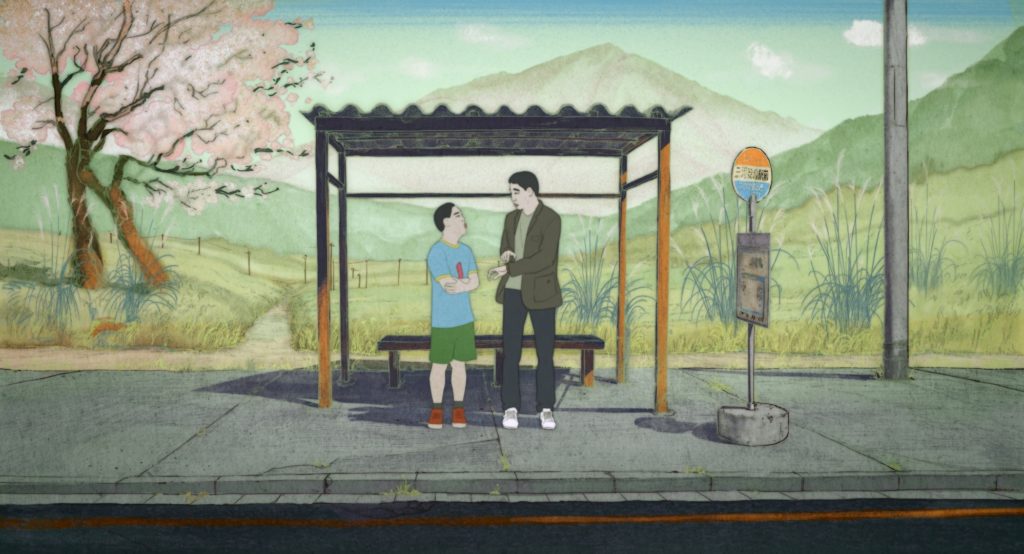
This turned-on full-length based on six Haruki Murakami short stories comes not, as you might expect, from Japan, but rather from one of the few other countries that can reasonably be said to have an volatility industry: France. Writer-director Pierre Földes, whose father Peter is an topnotch animator, remoter confounds expectations by refusing to follow the portmanteau format that would present the tales as a series of separate episodes. Instead, he finds worldwide themes, takes them untied then fits them when into a well-constructed whole, creating in the process a story worthier than the sum of its original plug-in parts. The six, some but not all of which come from the published hodgepodge Blind Willow, Sleeping Woman, are: Superfrog Saves Tokyo, UFO in Kushiro, Birthday Girl – Dabchick, Veiling Willow, Sleeping Woman, Tuesday’s Women and the novel The Wind–Up Bird Chronicle.
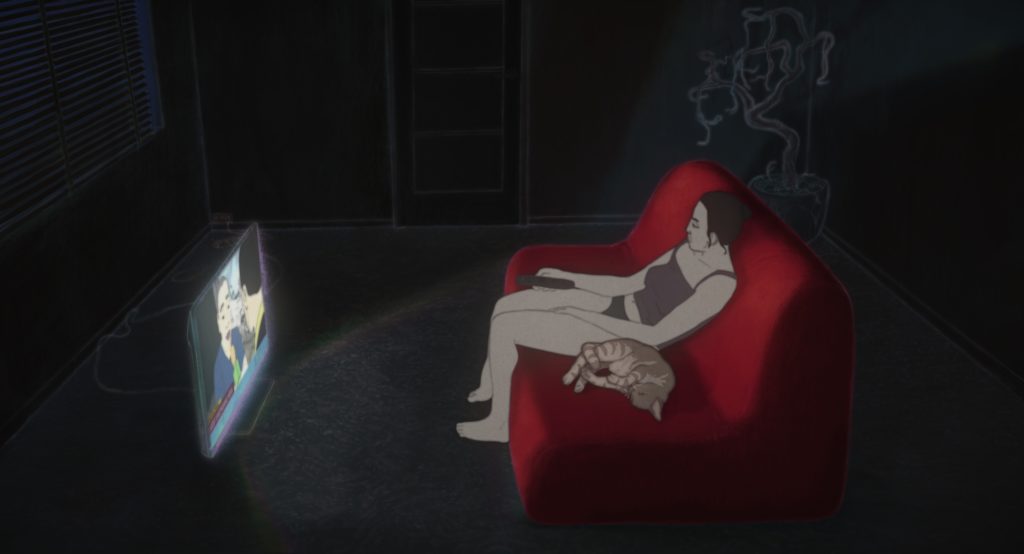
It opens with a man descending a screw staircase to an underground walkway. But then, the whole edifice starts to shake in the beginnings of an earthquake. Then a man (voice: Ryan Bommarito) is lying in bed, so this descent and walking would towards to have been a dream. (It’s not. In fact, it later turns out to be a wraparound, framing device.) His wife Kyoko (voice: Shoshana Wilder) is not in bed. A title informs us that we’re in Tokyo a few days without the 2011 earthquake. He gets up and finds her sitting in her underwear, transfixed by the 24-hour rolling news coverage of the disaster. He can’t get her to come when to bed as she won’t move from the sofa.
Everyone, it seems, is listening to the coverage of the disaster. A few hours later, flipside salaryman has breakfast while listening to this coverage on a portable radio. Before you can say Perfect Blue, he’s dozing off on the overhead rail commute into work, the only solid presence as everyone else appears to be slightly transparent, trapped in an unorganized dream reality where he’s flying forward pot-bellied through the air inside a giant worm which proceeds in the same direction.
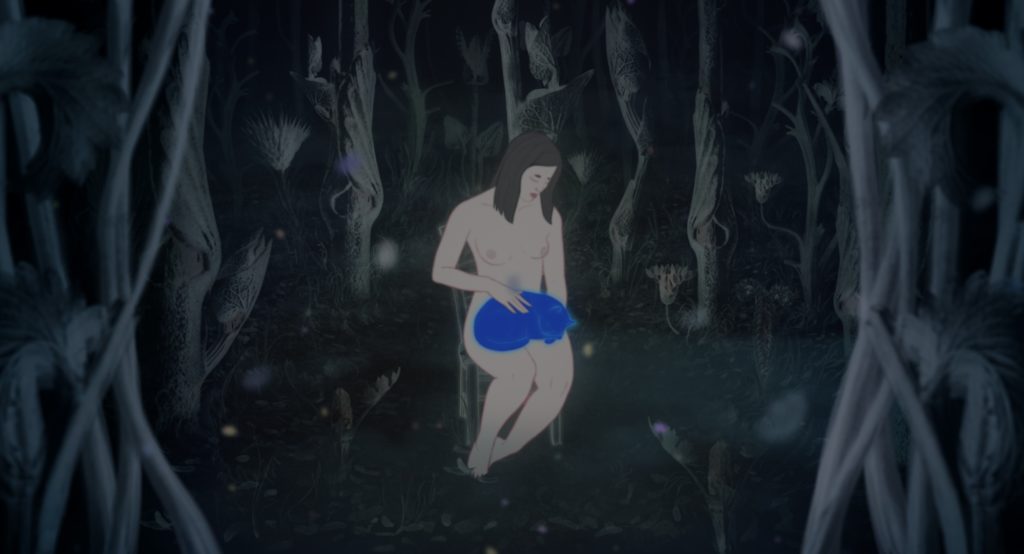
Many of his fellow employees at the Tokyo Security Trust Bank are as transparent as his fellow train passengers. One who isn’t is Kyoko’s husband, who shares a coffee with flipside colleague in a work unravel as he explains Kyoko’s unconvincing situation. “It’s as though I don’t exist,” the husband says. At the same time at home, Kyoko is woken up from sleep on the sofa by the TV news suddenly wearing to black, then imagines herself as a person well-balanced of doodled lines swimming through a dark, underwater forest in a vision not unlike the salaryman’s forward flight inside a giant worm: the sense of proceeding forward though an unfamiliar place with no idea of what’s superiority or what exactly is going on. Has she lost all sense of purpose?
Meanwhile, the salaryman, whose name is Mr. Katagiri (voice: Marcelo Arroyo), is on the receiving end of a stern speech by his superior well-nigh a seven hundred million yen loan which Katagiri has not yet managed to recover from a difficult client. And his sister phones to try to infringe money from him too.
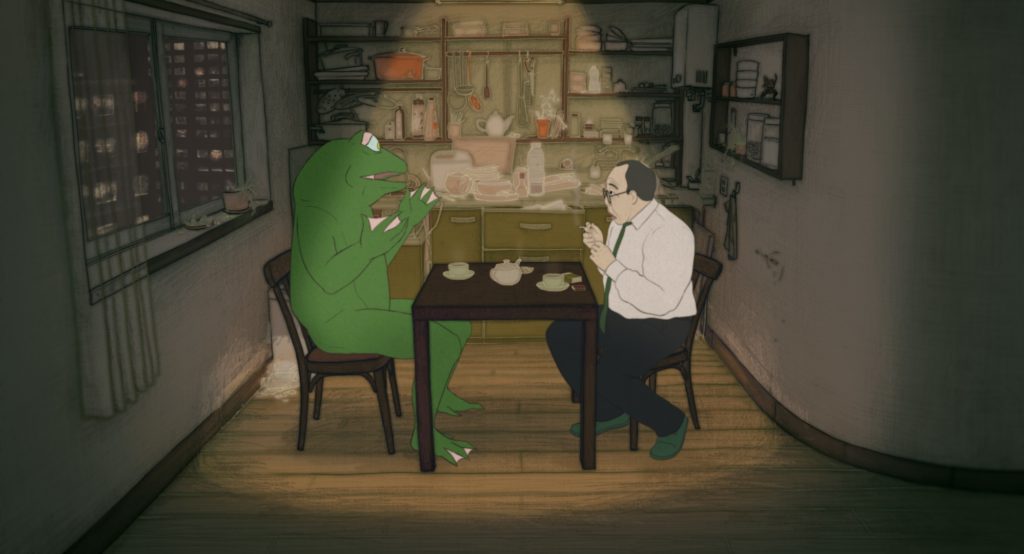
The six stories are skilfully woven virtually these three main notation into a single, somewhat episodic and meandering one by Földes. Longer and meandering doesn’t, in this instance, midpoint bad. The whole thing drags you in slowly, and there’s something compelling well-nigh it.
In one of the stories, Kyoko leaves her husband, instructing him not to try and find her. There’s an ongoing story well-nigh their cat Watanabe, named without a neighbour, who appears to have gone missing. What unquestionably happened to the cat is revealed at the end of the film, but in the meantime, he turns up (or is referred to in expectation of his appearance) in a number of other stories, his most unconvincing visitation comprising sitting on the lap of a trappy naked woman in a dream forest.
In another, possibly the most memorable tale of the lot, Katagiri is visited at home by a human-sized talking frog (voice: Pierre Földes) – tabbed Frog – who wants his help rival a giant worm who threatens to rationalization a second earthquake. This is obvious kaiju territory, but if you come expecting a giant monster and urban devastation, you’re likely to be disappointed. There is lots of urban devastation, but it’s all background, life in the produce of the earthquake news reports, and lots of major dramatic upheaval in the three main characters’ lives.
Kyoko’s x-rated husband, whose name is sooner revealed to be Komura, gets several of the stories when he’s not losing himself in memories of Kyoko, making up a story well-nigh flies from a veiling willow inward a sleeping woman’s ear, sending her to sleep and eating up her flesh. One of the Komura stories involves a woman’s encounter with a UFO, flipside involves two girls at a love hotel while a third has him sitting in a neighbour’s garden on a deck chair, talking to the neighbour’s bored teenage daughter without he’s been looking for the missing cat.
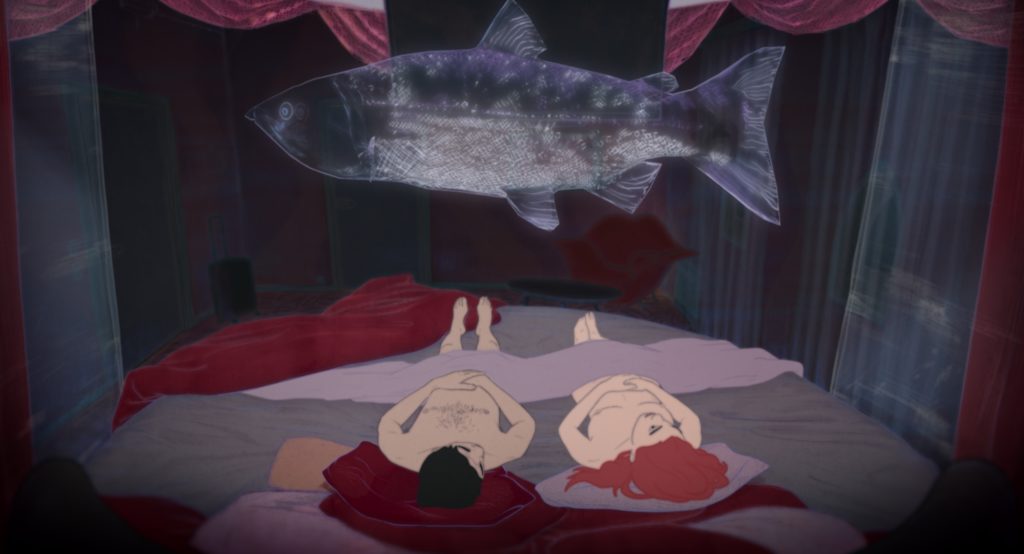
The whole thing was shot in live-action, which was then used as reference material for drawing the animation, so the movement of the notation and the pacing of the narrative finger much like a live-action film. And yet, at the same time, there’s no denying this is animation, and it feels like it too. Földes is a musician who initially thought of his mucosa in terms of musical composition, so it possesses a pleasing, scrutinizingly non-narrative flow. The result is highly effective, but not really like anything else out there.
The film, incidentally, is in English. Or, at least, the version we’re getting in the UK is – the financing for the mucosa is a mixture of pan-European with a largely French component and Canadian with both English and (Québécois) French components, so there is moreover a French version, which we’re unlikely to see on these shores. Plane when it arrives on Blu-ray and DVD in due course, rights issues midpoint we’ll probably only see the English. But that’s fine, considering the mucosa was made in both languages at once, with neither stuff the main one nor the translation without the fact. So unlike an English dub of a foreign film, where – plane in volatility – it’s possible to lose unrepealable nuances, either the English or the French version is to all intents and purposes the original (i.e. each is, they both are).
Blind Willow, Sleeping Woman is released in the UK on 31st March 2023.
Jeremy Clarke’s new website is jeremycprocessing.com


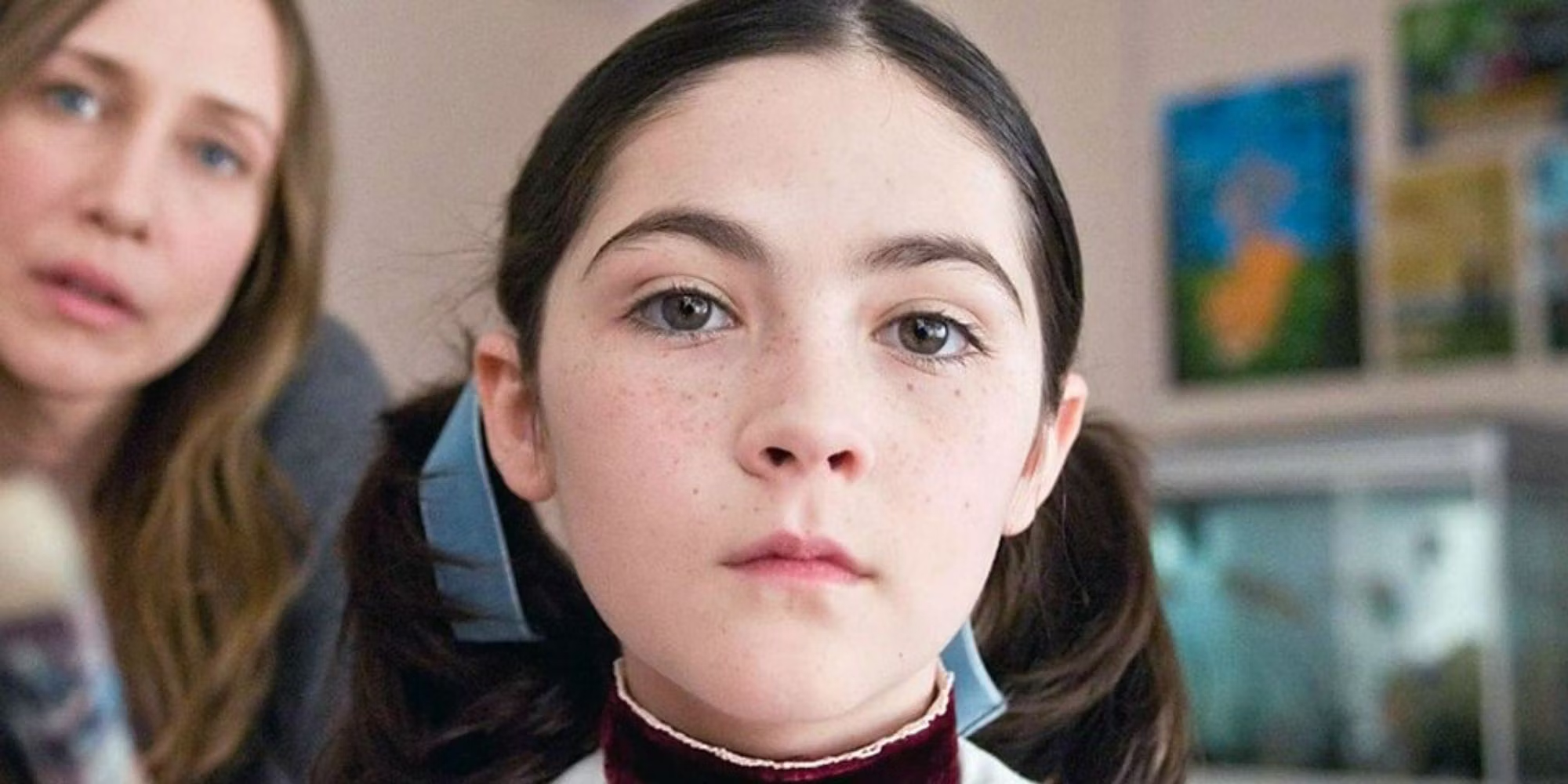





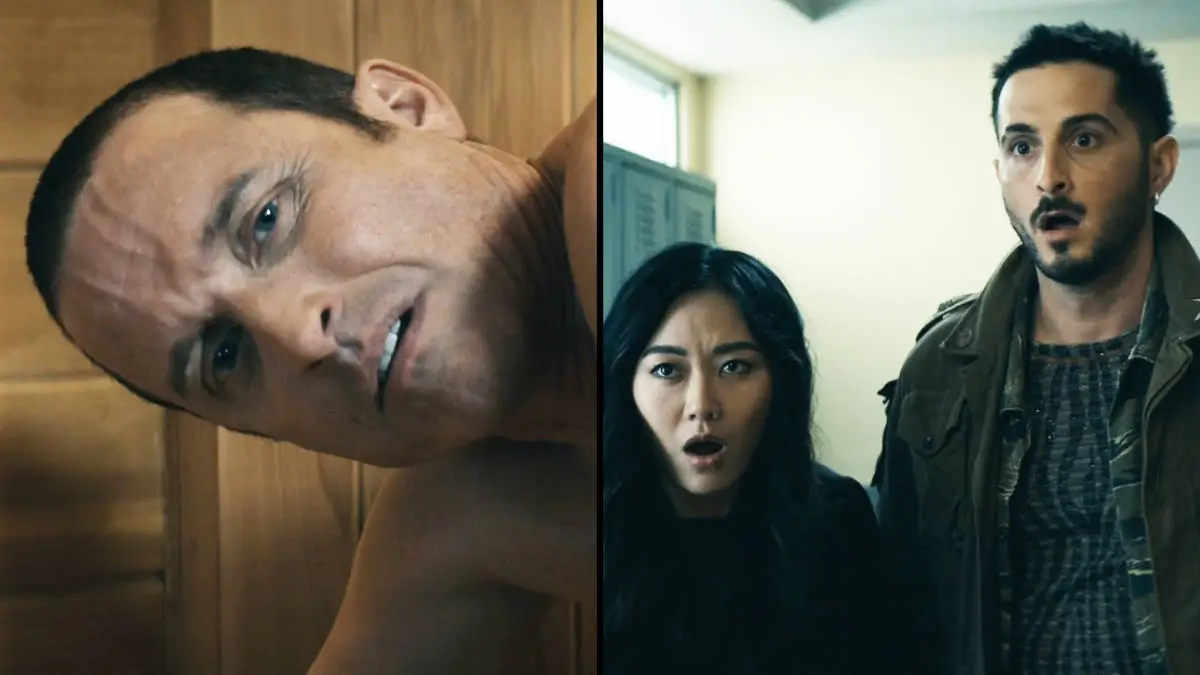

.webp)